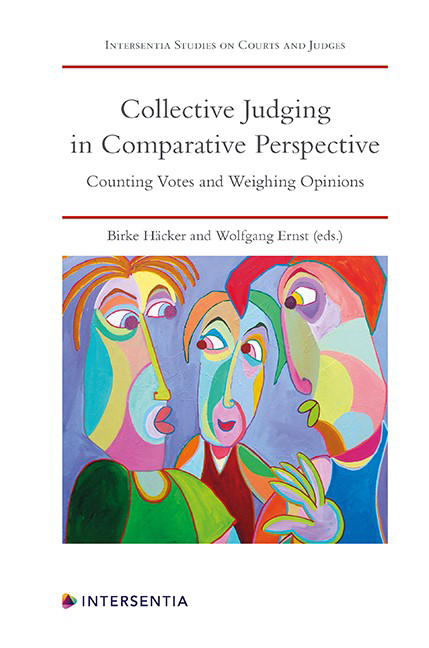Book contents
- Frontmatter
- Preface
- Contents
- List of Cases
- List of Contributors
- PART I DESIGNING COLLEGIATE COURTS’DECISION-MAKING PROCESSES
- PART II COLLEGIATE COURTS IN THE COMMON LAW TRADITION
- PART III COLLEGIATE COURTS IN THE EUROPEAN CIVIL LAW TRADITION
- PART IV COLLEGIATE COURTS IN A NON-EUROPEAN CIVIL LAW JURISDICTION: THE CASE OF JAPAN
- PART V SUPRANATIONAL AND INTERNATIONAL COLLEGIATE COURTS
- PART VI VOICES FROM THE AUDIENCE AND CLOSING REMARKS
- About the Editors
Chapter 17 - Collegiality and Collectivity in Common Law Courts
Published online by Cambridge University Press: 09 February 2021
- Frontmatter
- Preface
- Contents
- List of Cases
- List of Contributors
- PART I DESIGNING COLLEGIATE COURTS’DECISION-MAKING PROCESSES
- PART II COLLEGIATE COURTS IN THE COMMON LAW TRADITION
- PART III COLLEGIATE COURTS IN THE EUROPEAN CIVIL LAW TRADITION
- PART IV COLLEGIATE COURTS IN A NON-EUROPEAN CIVIL LAW JURISDICTION: THE CASE OF JAPAN
- PART V SUPRANATIONAL AND INTERNATIONAL COLLEGIATE COURTS
- PART VI VOICES FROM THE AUDIENCE AND CLOSING REMARKS
- About the Editors
Summary
INTRODUCTION
This chapter examines the question of collegiality in relation to judgment-writing in two common law apex courts: the United Kingdom Supreme Court (UKSC) and the High Court of Australia (HCA). During 2017, when the conference that gave rise to this collection took place, both courts went through periods of transition after the retirements of Lord Neuberger PSC and French CJ with new leadership and new appointments: Lady Hale as President of the UKSC and Susan Kiefel AC as Chief Justice of Australia, respectively. Lady Hale has since retired and been succeeded by Lord Reed, who has reiterated the Court‘s preference for ‘single judgments or at least a single majority judgment … where possible‘. The aim of this chapter is to draw upon statistics for each court, in order to provide context for reflections on the practice in respect of collective judging, and to complement other chapters in this collection.
In order to keep within the necessary confines, the chapter relies upon a study of the statistics for each court from 2017 to 2019: these statistics reveal a significant level of continuity and settled practice in the case of each court. I also draw upon the extra-curial comments of leading Justices of each court.
I argue that judicial individuality is not incompatible with collegiality on a multi-member appellate court. In so doing, I respectfully suggest some reservations about the approach taken by the HCA. I suggest that there may be lessons to be learnt for the HCA from the process of gradual reform over the first decade of the UKSC. The divergences in practice between the UKSC and HCA demonstrate that there is no common ‘common law‘ approach to judgment-writing in apex courts, which has implications for the dynamics of decision-making.
THE COURTS AND THEIR ERAS
The UK Supreme Court was inaugurated in 2009, having been provided for by the Constitutional Reform Act 2005 (UK), Part 3. Prior to that, the final court of appeal in the United Kingdom has been the Appellate Committee of the House of Lords.
- Type
- Chapter
- Information
- Collective Judging in Comparative PerspectiveCounting Votes and Weighing Opinions, pp. 303 - 322Publisher: IntersentiaPrint publication year: 2020

